|
|
|
Sort Order |
|
|
|
Items / Page
|
|
|
|
|
|
|
| Srl | Item |
| 1 |
ID:
115067
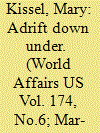

|
|
|
|
|
| Publication |
2012.
|
| Summary/Abstract |
John Winston Howard wasn't just voted out of office after a remarkably steady eleven-and-a-half-year stretch atop Australian politics in November 2007. He lost the prime minister's job to Kevin Rudd, a cheerless career bureaucrat with a skimpy parliamentary record, and lost his local seat to a toothy blond broadcaster with no political experience at all. Yet today the young and the old mob Howard when he wanders out in Sydney, wanting an autograph and a snap with the seventy-two-year-old. They realize that Australia's current leaders have veered the country away from the steady, prosperous path it was on for the past three decades, and in addition to feeling nostalgia for better days they want someone to steer their country back on track.
|
|
|
|
|
|
|
|
|
|
|
|
|
|
|
|
| 2 |
ID:
154835
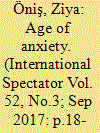

|
|
|
|
|
| Summary/Abstract |
The crisis of liberal democracy is closely associated with major global shifts, which have been accelerated by the global financial crisis of 2008, with its dislocating effects in the established democracies of the global centre. Relative stagnation and rising problems of inequality and unemployment, coupled with additional shocks in the form of mass migration and terrorist attacks have generated fertile grounds for the rise of right-wing radical populist sentiments, which have been turned into electoral advantage by charismatic leaders. The crisis of liberal democracy is also a global phenomenon in the sense that liberal democracy has been severely challenged by the rise of strategic models of capitalism, notably its authoritarian version represented by the growing power and influence of the China-Russia coalition. Indeed, the success of the latter has served as a kind of reference for many authoritarian or hybrid regimes in a changing global context, at a time when the key Western powers appear to be losing their previous economic and moral appeal.
|
|
|
|
|
|
|
|
|
|
|
|
|
|
|
|
| 3 |
ID:
114156
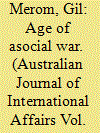

|
|
|
|
|
| Publication |
2012.
|
| Summary/Abstract |
Why, in spite of past failures, do liberal democracies continue to intervene militarily and fight counterinsurgency wars? The answer is grounded in learning. Liberal democracies acknowledge past failures, tracing them to the interaction between the events on the battlefield and society at home. Specifically, they identify the educated middle class and its mix of expedient and altruistic motivations as preventing effective military campaigns and victory. Hence, the main effort of liberal democracies is that they aim to fight wars that are divorced from society. At their disposal are advanced military technology, the professional all-volunteer force, proxies and alliance partners, and private military companies. The desocialising effects of these are complemented by control of the media and thereby the flow of information from the battlefield to society. Liberal democracies have found a way to continue to play the violent game of world politics, but they do so less democratically as they fight asocial wars.
|
|
|
|
|
|
|
|
|
|
|
|
|
|
|
|
| 4 |
ID:
050458
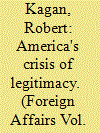

|
|
|
|
|
| Publication |
Mar-Apr 2004.
|
| Summary/Abstract |
Europeans accuse the United States of acting like a bully: aggressive, self-interested, and disrespectful of rules. That charge is hypocritical. Still, it must be taken seriously, for as a liberal democracy with a global vision, the United States needs the approval of other nations that share its ideals. The American project is in Europe's interest, too--whether the Europeans understand that or not.
|
|
|
|
|
|
|
|
|
|
|
|
|
|
|
|
| 5 |
ID:
163947
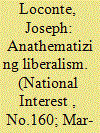

|
|
|
|
|
| Summary/Abstract |
The Catholic medieval project, for all its achievements, ultimately failed to uphold one of the most transformative ideas of the Jewish and Christian traditions: the freedom and dignity of every human soul.
|
|
|
|
|
|
|
|
|
|
|
|
|
|
|
|
| 6 |
ID:
127189
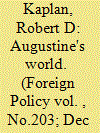

|
|
|
| 7 |
ID:
095051
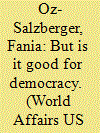

|
|
|
| 8 |
ID:
046921
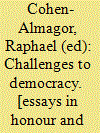

|
|
|
|
|
| Publication |
Aldershot, Ashgate Publishing, 2000.
|
| Description |
xxxviii, 305p.
|
| Standard Number |
0754620956
|
|
|
|
|
|
|
|
|
|
|
|
Copies: C:1/I:0,R:0,Q:0
Circulation
| Accession# | Call# | Current Location | Status | Policy | Location |
| 044254 | 321.8/COH 044254 | Main | On Shelf | General | |
|
|
|
|
| 9 |
ID:
174778
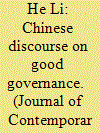

|
|
|
|
|
| Summary/Abstract |
Since Xi Jinping came to power in 2012, governance reform and innovation have become a central pillar of China’s grand strategy. Meanwhile, the debate on good governance gained momentum among the Chinese intellectuals ranging from the proponents of good governance, New Leftists, liberals, champions of political meritocracy, and advocates of the Singapore model. This study uses content analysis to examine the works by leading Chinese scholars and other primary materials. This study finds that the Chinese intellectual discourse on governance is a double-edged sword. It has generated some important theoretical rendering and practical designs of the governance reforms that the Party-state could cherry-pick., Yet, the enhanced governance capacity could help the regime build up legitimacy without convergence to liberal democracy.
|
|
|
|
|
|
|
|
|
|
|
|
|
|
|
|
| 10 |
ID:
046752
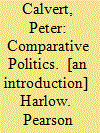

|
|
|
|
|
| Publication |
Harlow, Pearson Education Limited, 2002.
|
| Description |
xiv, 351p.
|
| Standard Number |
0582438233
|
|
|
|
|
|
|
|
|
|
|
|
Copies: C:1/I:0,R:0,Q:0
Circulation
| Accession# | Call# | Current Location | Status | Policy | Location |
| 045633 | 320.3/CAL 045633 | Main | On Shelf | General | |
|
|
|
|
| 11 |
ID:
178996
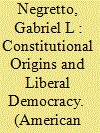

|
|
|
|
|
| Summary/Abstract |
A strong tradition in democratic theory claims that only constitutions made with direct popular involvement can establish or deepen democracy. Against this view, we argue that new constitutions are likely to enhance liberal democracy when they emerge through a plural agreement among political elites with distinct bases of social support. Power dispersion during constitution writing induces the adoption of institutions that protect opposition forces from the arbitrary use of executive power without unduly impairing majority rule. However, since incumbents may renege on the bargain, the democratizing effect of politically plural constitutional agreements is likely to be larger in the short term, when the identity of negotiating political forces and the balance of power between them tend to remain stable. We find support for these arguments using an original global dataset on the origins of constitutions between 1900 and 2015 and a difference-in-differences design.
|
|
|
|
|
|
|
|
|
|
|
|
|
|
|
|
| 12 |
ID:
177213
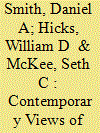

|
|
|
|
|
| Summary/Abstract |
What are Americans’ views on liberal democracy? Have their attitudes changed since the 1950s? How do their attitudes about liberal democracy shape political behavior, such as vote choice? We replicated McClosky’s (1964) seminal study on a module to the 2016 Cooperative Congressional Election Study. Our exploration of 26 survey questions reveals both continuity and change in Americans’ attitudes toward liberal democracy. Whereas Americans have become more hostile toward some standard democratic procedural rules of the game, we also find that they harbor more tolerant attitudes toward racial and ethnic equality. We subjected respondents’ answers to an exploratory factor analysis, which reveals three distinct dimensions regarding democratic values: elitism, authoritarianism, and racial supremacy. We find that elitism and racial supremacy significantly influenced political behavior in the 2016 presidential election and note that these factors contributed to mass unrest in 2020, exposing fault lines deeply rooted in America’s contentious political history.
|
|
|
|
|
|
|
|
|
|
|
|
|
|
|
|
| 13 |
ID:
188488
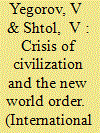

|
|
|
|
|
| Summary/Abstract |
SCHOLARS began to react to the rapid transformation of the world order at the first signs that the US was losing its supposedly indisputable global leadership.1 The main reason for the revision of the unipolarity of the world order was not so much the US's loss of its economic, military, and political superiority as the fact that Francis Fukuyama's declared "end of history," pursued by the US after World War II, never materialized. Numerous publications emerged noting the decline of the Western liberal democratic model of social development.
|
|
|
|
|
|
|
|
|
|
|
|
|
|
|
|
| 14 |
ID:
085897
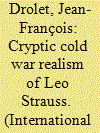

|
|
|
|
|
| Publication |
2009.
|
| Summary/Abstract |
This paper seeks to shed light upon recent controversies concerning Leo Strauss' alleged influence on contemporary American and global politics. It exposes and analyses Strauss' trenchant critique of liberal modernity and then offers a critical discussion on the nature of his legacy and the reception of his ideas in the United States since the 1950s. It is argued that although there are very good reasons to be anxious about the political implications of his ideas, when understood in the cultural and intellectual context of Weimar Germany and post-war America, Strauss' philosophical enterprise is more ambiguous than it has been suggested by his most fervent detractors in recent feuds over America's 'war on terror'. To the extent that Strauss has anything to do with contemporary politics and international relations, the analysis presented here suggests that his influence has less to do with the Bush administration's war cabinet than with the long-drawn efforts of neo-conservative intellectuals to foment the political and socio-cultural conditions that have facilitated the 're-nationalisation' of America and its incremental departure from the socio-economic and geopolitical pacts of the post-war period since the 1970s.
|
|
|
|
|
|
|
|
|
|
|
|
|
|
|
|
| 15 |
ID:
096190


|
|
|
|
|
| Publication |
2010.
|
| Summary/Abstract |
Science functions best within a liberal democracy. Every hypothesis test is an expression of doubt, as it carries with it the implication that a particular presumption may be incorrect (Kruschke 1998), whereas authoritarianism punishes challenges to prescribed beliefs. Consequently, science can lead to true innovation and improvements in knowledge only when laws and social norms permit dissent.
|
|
|
|
|
|
|
|
|
|
|
|
|
|
|
|
| 16 |
ID:
111198
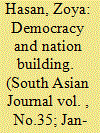

|
|
|
| 17 |
ID:
118975
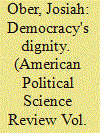

|
|
|
|
|
| Publication |
2012.
|
| Summary/Abstract |
Dignity, as equal high standing characterized by nonhumiliation and noninfantilization, is democracy's third core value. Along with liberty and equality, it is a necessary condition for collective self-governance. Dignity enables robust exercise of liberty and equality while resisting both neglectful libertarianism and paternalistic egalitarianism. The civic dignity required for democracy is specified through a taxonomy of incompletely and fully moralized forms of dignity. Distinctive features of different regimes of dignity are modeled by simple games and illustrated by historical case studies. Unlike traditional meritocracy and universal human dignity, a civic dignity regime is theoretically stable in a population of self-interested social agents. It is real-world stable because citizens are predictably well motivated to defend those threatened with indignity and because they have resources for effective collective action against threats to dignity. Meritocracy and civic dignity are not inherently liberal, but may persist within a liberal democracy committed to universal human dignity.
|
|
|
|
|
|
|
|
|
|
|
|
|
|
|
|
| 18 |
ID:
163068
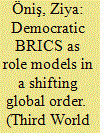

|
|
|
|
|
| Summary/Abstract |
India, Brazil and South Africa constitute an important subset of Brazil, Russia, India, China and South Africa (BRICS) and emerging powers at large in a shifting global order. The article examines the capacity of these democratic BRICS to serve as a role model to the rest of the developing world, at a time when liberal democracy seems to be experiencing serious challenges and dislocations in the Global North. The article considers the important achievements of democratic BRICS, in terms of their individual performances as well as through active cooperation strategies through organisations such as the India, Brazil and South Africa (IBSA) Dialogue Forum. Attention is drawn to the inherent structural dilemmas confronted by democratic BRICS to serve as genuine role models, given their domestic weaknesses as well as inherent constraints on their collective action strategies. Our central argument is that these countries, individually and collectively, are likely to have a crucial bearing on the future of liberal democracy on a global scale.
|
|
|
|
|
|
|
|
|
|
|
|
|
|
|
|
| 19 |
ID:
078854
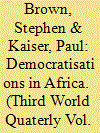

|
|
|
|
|
| Publication |
2007.
|
| Summary/Abstract |
This article focuses on four sub-Saharan countries that offer different insights into postcolonial democratic experiences on the continent. Botswana has enjoyed decades of uninterrupted multiparty politics (but single-party rule) under a political system that mixes Western-style liberal democracy with traditional top-down structures. Benin has democratised rapidly and relatively successfully after a long period of dictatorial rule, providing a transition model for several other African countries. Kenya's former ruling party reluctantly permitted a multiparty system in 1991, but resisted further democratisation and remained in power for another decade by manipulating (at times violently) the transition process. In Burundi democracy was severely undermined in 1993, when army extremists assassinated the first freely elected president, sparking waves of retributional 'ethnic' violence that have recently subsided, but not yet ended, despite positive developments in the political transition process. After presenting these cases, the authors explore competing explanations for success and failure in democratic transitions and survival by focusing on voluntaristic and structural factors particularly relevant to the continent. The comparative case study approach, supplemented by these thematic investigations, allows the authors to consider the continent's grave impediments to democratisation and how they might be overcome, as well as to critically evaluate alternatives to the dominant Western model of liberal democracy.
|
|
|
|
|
|
|
|
|
|
|
|
|
|
|
|
| 20 |
ID:
069174
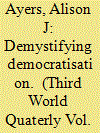

|
|
|
|
|
|
|
|